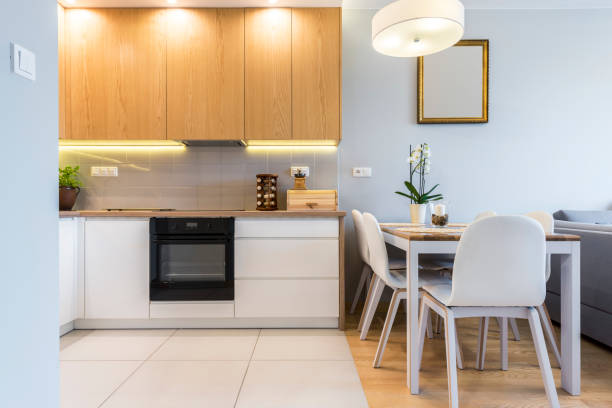For the long-term longevity of historical wooden buildings, constructors and users who manage this subject must know wood properties perfectly!
Wood is an organic, hygroscopic, and anisotropic substance. Its thermal, acoustic, electrical, mechanical, aesthetic, working, etc., elements are very appropriate for building a comfortable house using only wooden products. With other materials, it is almost impossible. Wood has some dynamic disadvantages too.
Contents
How Are Tiles Becoming The Favorites Over Woods?
But over time, the preferences of people for their home has changed. Now people prefer tiles more than wood. So tile has taken the place of wood.
Therefore, in this article, I’ll tell you all the ins and outs of why tiles are more suitable to home-owners compared to wood tiles
Stain And Chemical Resistant
Maximum ceramic or any other materials (except wood) are highly resistant to staining, and this makes them one of the significant reasons for becoming the favorites to many homeowners.
You can use specified and customized ceramic surfaces in hospitals, abattoirs, or virtually any commercial environment.
Most of the porcelain tiles are primarily waterproof and are highly resistant to liquid absorption and subsequent staining. Furthermore, glazed ceramic tiles do not stain.
Heat And Fire Resistant
Tiles do not burn. The material’s static nature determines that no toxins or volatile organic compounds will get released during a deadly fire. It makes tiles a great option for kitchens.
Tiled surfaces reduce the fire’s spread, and the surface cannot be marked or burned by a lit cigarette. This means that a tile can emit no smoke or gas.
Scratch Resistant
Glazed porcelain tiles are dense and incredibly hard and strong. Tilers require a diamond-edged cutter to score and cut tiles. It means that tiles are very resistant to wear and tear, including scratches.
Easy Cleaning
The majority of ceramic tile installations can be easily cleaned just by sweeping away dust and light mopping.
A tile’s low porosity means that tiles will not stain or grab dirt, so they can be easily cleaned and maintained.
Versatile
Tiles can be laid in many residential and commercial applications. Hardwearing or Exceptional Life Cycle Life Cycle Analysis (LCA) studies said that ceramic tiles materials could last more than 75 years if selected appropriately.
Energy Efficient
The tile can adjust to the air temperature of your room. This actually minimizes cooling and heating expenses.
Clay products are capable of absorbing heat and naturally release it when the ambient temperature falls.
Porcelain tiles are very effective as thermal insulators.
Anti-bacterial
Modern ceramic tile products are produced with titanium dioxide into the tile’s surface, ensuring the tiles are effortless to clean.
Tiles also create an antibacterial effect. The photocatalytic process produces O2 active oxygen, which can quickly decompose microorganisms like bacteria, fungi, mold, viruses, etc.
Even the antibacterial-resistant ‘superbugs’ are destroyed. This method also breaks down toxic emissions like nitrous oxide from motor vehicles.
Tile can be beneficial when used in hospitals, and private homes, bringing significant health and various other environmental benefits.
Zero Allergens
Tiles are made from natural components. Their production process eliminates all free radical bacteria and possible allergens.
Tiles are also free from PVC, formaldehyde, and VOC, which means you can feel confident that your tiled floor is safe for people with asthma, children, and yourself.
Fit For Purpose and Safe
The wide range of tiles allows us to select the perfect tile for any type of application. The technological advancements in tile production make anything possible, whether
it’s wood features cladding; a stone looks to combine in with existing flooring or a warm timber feel.
Tiles are also available on different slip-resistant surfaces that also give extra grip. This is indeed appropriate for swimming pool surrounds and building codes requiring specific food traffic.
Note: Read more F95Zone community guidelines & articles.
Anti Static
Unlike other flooring materials, tile is electrically neutral. It means that they cannot become electrically charged when walking or touching them due to friction. The well-being of this is that you will never receive a jolt of electricity from any static.
Other benefits include installing electrically conductive flooring for commercial and other applications like operating theaters where anti-static properties are needed for safety and security.
However, tiles also provide durability, increased marketability, moisture resistance, etc. So because of various benefits, people install tiles rather than wood or other materials.
Disadvantages of Wood Tiles
Wood has some disadvantages. Some of these are:
- Wood is an absorbent substance. This means that it will adsorb surrounding compressible vapors and lose moisture.
- Woods are organic materials. Like any organic component, wood is a nutritional component for some plants and animals. Some fungi and insects can digest wood and use it as a nutrient product. Insects drill holes and drivelines into the wood. More dangerously, fungi cause the wood to damage partially or entirely.
- Due to attack by decay fungi, wood-boring insects’ biological collapse, and marine borers during its processing and in-service have technical and economic importance.
- It is not possible to make wood non combustible like inorganic goods. Wood quickly catches fire. Wood contains organic compounds that are composed mainly of carbon and hydrogen.
They also can mix with oxygen and burn. Due to these properties, wood is classified as a combustible product. So the use of wood in the home increases the risk of fire.
I hope this article will help you know why tiles are more preferable to wood floorings.

